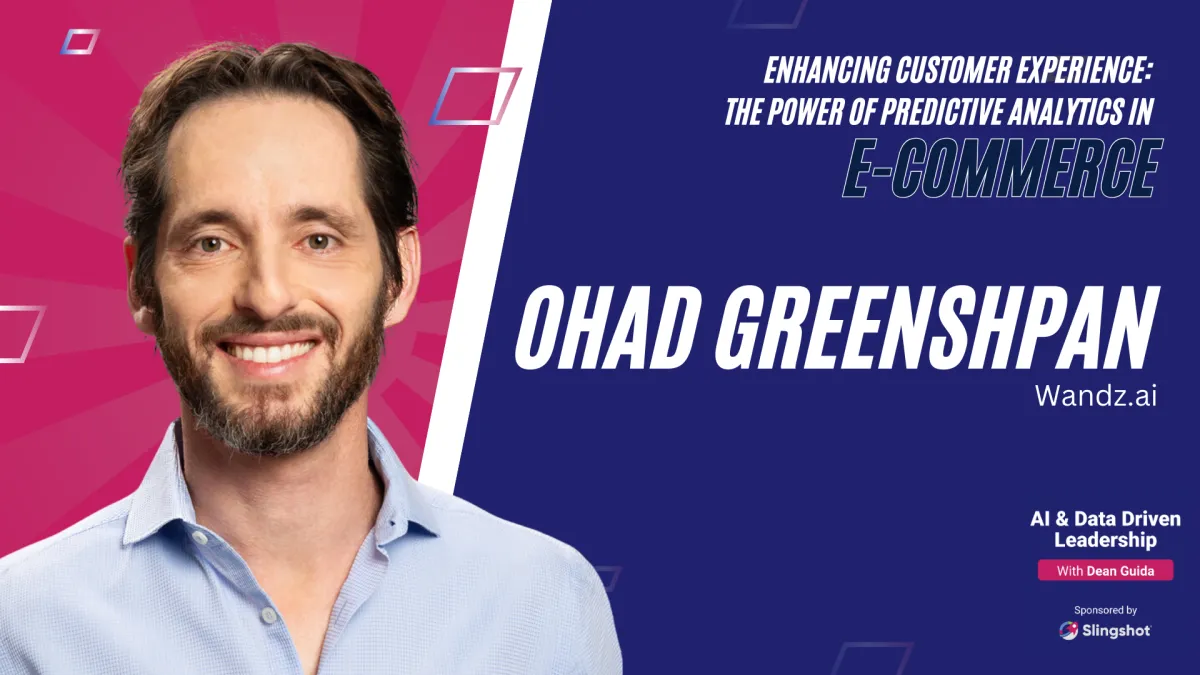Blog

10 - Enhancing Customer Experience: The Power of Predictive Analytics in E-Commerce
Enhancing Customer Experience with AI: Insights from Ohad Greenshpan, CEO of Wandz.ai
In the latest episode of our podcast, we had the pleasure of hosting Ohad Greenshpan, the CEO of Wandz.ai. The conversation delved into the transformative role of artificial intelligence (AI) in enhancing customer experiences for online businesses. Ohad shared the evolution of Wandz.ai, its innovative technologies, and how they leverage predictive analytics to understand and engage customers more effectively. This blog post will break down the key insights from the episode, offering actionable advice and thorough explanations to help businesses leverage AI for improved customer engagement.
Company Background and Evolution
Origins and Initial Focus
Wandz.ai, originally founded as Nomura, began its journey a decade ago. The company initially focused on developing a product that detects client-side distractions on users' browsers, such as pop-ups, coupons, and cashback offers not provided by retail and e-commerce businesses. This approach aimed to address a gap where businesses were largely unaware of the distractions affecting their customers' online experiences.
Expansion and Rebranding
As the company evolved, particularly during the COVID-19 pandemic, Wandz.ai expanded its vision beyond merely blocking distractions. They acquired companies that developed a prediction engine capable of forecasting user intent and potential abandonment. This allowed them to deliver real-time promotions based on user behavior. Additionally, they integrated powerful email and SMS capabilities to extend their reach beyond online interactions to offline engagements.
In April of the previous year, Wandz.ai rebranded itself to reflect this broader vision, introducing the Adaptive CX Platform. This platform is designed to provide a more sophisticated understanding of customer behavior, particularly for the 90% of users who are anonymous and not logged in. Ohad emphasizes that even in 2025, many businesses still lack insights into these users, treating them as generic visitors rather than potential customers.
The Concept of Adaptive Customer Experience (CX)
Real-Time Actions Based on Behavior
Ohad elaborates on the concept of Adaptive CX, which involves taking real-time actions based on a visitor's past, present, and predicted future behavior. For example, if a user is about to leave a website to purchase from a competitor, Wandz.ai's platform can recognize this intent and intervene with a targeted offer to retain the customer.
Dynamic Online Experience
The adaptive engine collects data in real-time, allowing businesses to react promptly to user actions. This capability is crucial in a digital landscape where static websites fail to engage users effectively. The goal is to create a dynamic online experience that responds to user behavior, ultimately transforming customer interactions.
Understanding Customer Profiles and Predictive Analytics
Common Customer Behaviors
Ohad notes that while businesses often believe they are unique, their customers exhibit common behaviors. For instance, users with ad blockers tend to be better shoppers across various websites. Similarly, users with password savers are more likely to complete purchases due to the convenience these tools provide.
Building a Generic Framework
Wandz.ai's approach involves building a generic framework that connects target outcomes—such as purchasing or subscribing—to relevant data. AI and machine learning (ML) rely on historical data and feedback loops to improve predictions. By training models on past behaviors, businesses can identify patterns and make informed decisions about customer engagement.
Layered AI Models for Different Business Needs
Ohad describes the three layers of AI models that Wandz.ai offers to accommodate businesses with varying levels of sophistication:
Black Box Models: For businesses with limited capacity, Wandz.ai provides pre-trained models that can be easily imported. These models predict outcomes like purchase likelihood or subscription rates without requiring extensive training.
Template Models: More sophisticated businesses can utilize templates to train models on their specific data. This process is quick, taking around 20 minutes, and allows businesses to tailor predictions to their unique customer behaviors.
Custom Models: For the most advanced users, Wandz.ai offers the ability to build custom models tailored to specific business needs. This layer is designed for product managers who have a vision for improving customer experiences but may not have extensive technical expertise.
The platform is designed to be user-friendly, enabling product managers to implement changes without needing deep technical knowledge. This democratization of AI allows businesses of all sizes to leverage advanced analytics to enhance their customer interactions.
Business Impact and Measuring Success
Defining Key Performance Indicators (KPIs)
The impact of Wandz.ai's solutions varies based on the specific goals of each business. Product managers typically define key performance indicators (KPIs) to measure success, such as conversion rates, revenue per user, or customer retention.
Actionable Insights and Testing Strategies
Wandz.ai's models are designed to provide actionable insights that can lead to improved business outcomes. By testing different strategies and measuring the uplift between test and control groups, businesses can refine their approaches and optimize customer engagement.
Predictive Analytics and Customer Engagement
Identifying Potential Customer Actions
Wandz.ai utilizes predictive analytics to identify potential customer actions. For instance, if a user is predicted to abandon their shopping cart, the system can trigger targeted interventions, such as personalized promotions or reminders. This approach not only enhances the customer experience but also significantly boosts conversion rates.
Case Study: Abercrombie & Fitch
Ohad shares a compelling case study involving Abercrombie & Fitch, where the company hypothesized that many visitors bypass the homepage and directly access product pages. By targeting these users with relevant messaging from the homepage, they achieved a remarkable 50% increase in conversion and revenue.
The Importance of Timing and Targeting
Selective Approach to Messaging
It’s crucial to show messages to the right people at the right time, rather than bombarding all users with promotions. This selective approach ensures that customers receive relevant information when they are most likely to engage, thereby enhancing their overall experience.
Data Utilization and Model Training
Leveraging Extensive Data
Wandz.ai has already deployed its technology across 15 billion unique monthly visitors, leveraging a vast amount of pre-trained models. This extensive data allows the company to recognize patterns across various e-commerce businesses without needing specific client data initially. However, as clients engage with the platform, they can also develop models tailored to their unique data over time.
Client Base and Market Focus
Target Market
Wandz.ai primarily works with businesses generating $50 million or more in revenue, extending to some of the largest retailers in the U.S. This focus allows Wandz.ai to provide significant value to clients who are ready to leverage advanced AI solutions for their marketing strategies.
Impact of Generative AI
Psychological Impact
While generative AI has created a buzz in the industry, the real impact has been psychological. Some clients are eager to adopt AI technologies, while others express apprehension about data security and decision-making autonomy. Wandz.ai’s solutions are designed to enhance, not replace, human decision-making.
Natural Language Processing and Data Insights
Simplifying Data Access
Wandz.ai offers a feature that allows clients to ask questions in natural language about their data. This capability transforms user inquiries into SQL commands, enabling businesses to extract insights without needing extensive technical knowledge. By simplifying data access, Worns AI empowers clients to make informed decisions quickly and efficiently.
The Role of Creativity in Technology
Parallels Between Music and Technology
Ohad discusses his background in music and how it complements his work in technology. He draws parallels between music and technology, emphasizing the importance of creativity, problem-solving, and storytelling in both fields. The ability to innovate and think critically is essential for success in any discipline, including computer science and AI.
Encouragement for Future Generations
Importance of Education
Ohad encourages young people to pursue studies in computer science and related fields, highlighting that the skills learned are invaluable for problem-solving and innovation. While technology will continue to evolve, the foundational skills of critical thinking and creativity will remain essential.
Conclusion and Contact Information
This episode provides a comprehensive overview of how AI can transform customer experiences in e-commerce, the importance of data-driven decision-making, and the need for creativity and critical thinking in technology. Ohad Greenshpan’s insights offer valuable lessons for businesses looking to leverage AI to enhance their customer engagement strategies.
For more information, you can connect with Ohad Greenshpan and learn more about Wandz.ai through their website.
By breaking down the key insights from the podcast episode, this blog post aims to provide valuable, detailed information that can guide businesses in leveraging AI to enhance customer experiences. The actionable advice and thorough explanations offered here are designed to help businesses understand and implement AI technologies effectively.
Link to the episode: https://player.captivate.fm/episode/a09a0850-f93f-4c82-b800-8eced969709c/
Listen and Subscribe to the AI & Data Driven Leadership Podcast Now:
Say "Hey, Siri / Alexa. Play AI & Data Driven Leadership Podcast"
About The Host
Tech entrepreneur and CEO Dean Guida knows there’s a limit to what you can build with grit alone.
At sixteen, Dean bought the first IBM PC and fell in love with writing software. He went on to receive a Bachelor of Science degree in operation research from the University of Miami. After graduating, he was a freelance developer and wrote many systems for IBM and on Wall Street. At twenty-three, he started Infragistics to build UX/UI tools for professional software developers.
Seemingly overnight, Dean had to go from early internet coder to business operator—a feat that forced him to learn some of business’s biggest lessons on the job. He immediately began navigating the nuances of scaling a company, hiring and growing teams, and becoming a leader, a manager, and a mentor.
Fast-forward thirty-five years, and Dean’s tech company now has operations in six countries. More than two million developers use Infragistics software, and its client roster boasts 100 percent of the S&P 500, including Fidelity, Morgan Stanley, Exxon, Intuit, and Bank of America.

Media














